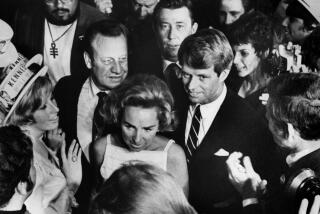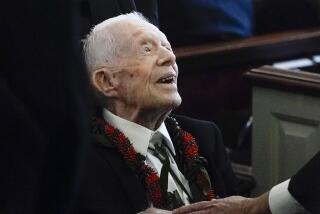It’s All Right to Still Like Ike : History: Once painted as a ‘distanced’ President, Dwight Eisenhower now is heralded for his strong sense of service.
- Share via
WASHINGTON — It has been almost 30 years since Dwight David Eisenhower left public office in January, 1961. And it has been more than 20 years since he died, in 1969.
But for hundreds who gathered at Washington’s Kennedy Center Sunday night to celebrate his 100th birthday, the years haven’t changed the way they feel about the country’s 34th President.
“There is no doubt about it,” said Charles Percy, the former Illinois senator, echoing the famous campaign slogan: “We like Ike.”
But recent memory may not have been quite as fond. The former Army general was outshined on the television screen by his successor, John F. Kennedy. And as the turbulent 1960s roiled the American conscience, some had painted Eisenhower as an administrator distanced from the work of government, preferring golf to governing.
But in recent years, this caricature has begun to crumble. The occasion of his centennial birthday has served to consolidate a new sense that Eisenhower was a better President than he has been given credit for being.
“We trusted his leadership,” Percy recalled. “He embodied, we felt, the best traits and highest values of an American. He was admired worldwide as a good man of great accomplishment.”
“All of us who were privileged to know Ike,” said Percy’s co-host, 90-year-old actress Helen Hayes, “have golden memories of General and President Eisenhower.”
The heavily decorated general, who served as NATO’s first supreme commander, would have approved of Sunday’s Kennedy Center celebration. The music was provided by the Air Force jazz ensemble, the Airmen of Note. The stage was lit in red, white and blue. And the festivities were opened by a military color guard, whose boots echoed in the reverent silence of the Center’s Eisenhower Theater.
The celebration brought together many of those whose lives were directly affected by the Eisenhower presidency, including Warren Burger, appointed to the federal bench by Eisenhower; E. Frederic Morris, one of the first blacks to serve in the White House, and Ernest G. Green, one of the black students who attended school under military escort in Little Rock, Ark., after the President decided to enforce desegregation there.
There were no long speeches. Wearing “I Like Ike” buttons, the audience watched film clips, offered toasts, and shared personal remembrances of Eisenhower and his wife, Mamie, who died in 1979.
The devil’s food cake was made from Eisenhower’s favorite recipe and cut by his two granddaughters as the audience sang “Happy Birthday, Mr. President.”
In fact, Sunday’s 100th birthday celebration had a 34-year-old precedent, one that captures the essence of the Eisenhower era. It too was brought back through a film clip:
At the end of the election season in 1956, the President wasn’t much in the mood for campaigning. He was preoccupied with the Suez crisis and the Hungarian uprising, and his health was poor. Yet the election was only one month away, and his Democratic opponent, Adlai Stevenson, was running hard.
So, in a thinly veiled campaign stunt, Hayes and a group of Hollywood celebrities held a birthday party for the President on nationwide television.
Hosted by Jimmy Stewart, with songs by Howard Keel, Jane Grayson and Nat King Cole, the President and Mamie joined in live from their White House living room. Hayes cut him a slice of birthday cake (made from Mamie’s recipe) during a party at Washington’s Statler Hotel. Irene Dunn and James Cagney also cut him a slice of Mamie’s cake from a children’s hospital ward in Los Angeles.
Then the President was presented with the signatures of Americans who had pledged to vote and “to do their duty in determining the course of America.”
It was a subtle campaign technique possible only in a more innocent era.
But then, the 1950s were something of an age of innocence. To many in attendance Sunday night, Eisenhower was the silent, authoritative father to whom a young America looked as it grew into national maturity in the 1950s.
“People got the sense that he was keeping an even hand on the helm so that they were not threatened by events in the world,” said Rocco Siciliano, a member of the Eisenhower White House who now serves on the board of trustees of Los Angeles’ Getty Foundation.
“Eisenhower played his role within the framework of those times,” recalled Bradley Patterson, deputy secretary to the cabinet. “The 1950s were a time when we sort of ignored things (such as social injustice),” Patterson admitted.
All the same, historians are revising their views of the Eisenhower presidency. At a three-day conference on his Administration at Gettysburg College last week, historians, statesmen and politicians credited Eisenhower with leading the Allies to victory in World War II, keeping inflation low, balancing the budget, and--during the iciest stages of the Cold War--having the vision to initiate exchange programs with the Soviets that might have opened the minds of the Gorbachev generation.
In the end, those gathered agreed, it was Eisenhower’s sense of service, developed in the military, that distinguished him from his presidential peers.
“He had a very strong sense of duty,” explained William Ewald, an Eisenhower historian. “There have been men in the White House who felt they were greater than the role they were asked to play. He never felt that. And that is the great lesson he holds up for all his successors.”
More to Read
The biggest entertainment stories
Get our big stories about Hollywood, film, television, music, arts, culture and more right in your inbox as soon as they publish.
You may occasionally receive promotional content from the Los Angeles Times.










